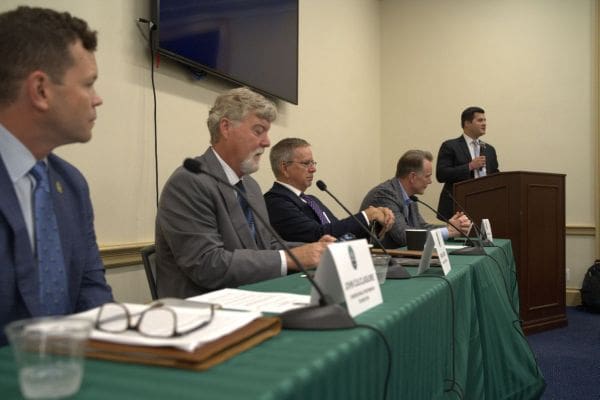Congressional Sportsmen’s Foundation Hosts Breakfast Briefing on Sustainable Forest Management, Launches New Programmatic Emphasis on Forest Policy

Last week, more than 50 congressional staff, leaders of forest policy, state foresters, and key partners attended the Congressional Sportsmen’s Foundation’s (CSF) Sustainable Forest Management Policy Briefing that highlighted forest policies and programs impacting wildlife and hunter access on private working forests and federal forests. At the briefing CSF announced its expanded emphasis on forest policy through the creation of a full-time Director of Forest Policy position.
Active forest management is critical for creating quality wildlife habitat, improving forest health and resiliency, mitigating risk to catastrophic wildfire, increasing forest carbon sequestration and carbon storage capabilities, and increasing access for sportsmen and women. CSF regularly engages on forest policy, and through the creation of the new forest policy specific position, CSF will significantly increase its work on forest management issues that impact sportsmen and women at the state and federal levels on private and public lands. John Culclasure, formerly CSF’s Southeastern States Director and a trained forester, stepped into the new Director of Forest Policy position after spending 8 years on CSF’s States Program Team.
“The Congressional Sportsmen’s Foundation has long recognized the importance of sustainable forest management to wildlife management and increasing access and opportunity for sportsmen and women,” said CSF President and CEO Jeff Crane. “We value our partnerships with the forestry community and look forward to amplifying the sportsmen’s voice on forestry issues through the launch of our dedicated Forest Policy Portfolio headed up by John Culclasure.”
The briefing consisted of a panel of experts representing the forest industry and the sportsmen’s community who discussed various forest policy issues ranging from collaborative wildlife conservation initiatives on private lands to wildfire risk reduction projects on federal public lands. The panel included Brian Luoma, retired President and CEO, The Westervelt Company; Bill Imbergamo, Executive Director, Federal Forest Resource Coalition (FFRC); David Tenny, President and CEO, National Alliance of Forest Owners (NAFO); and John Culclasure, Director of Forest Policy, Congressional Sportsmen’s Foundation.
Panelists at the briefing provided their perspectives on how sound forest management policy supports wildlife conservation for game and nongame species and the importance of collaborating with federal land managers to mitigate wildfire risk for the benefit of private and public forests, wildlife, and hunters and anglers. CSF is working with NAFO and other conservation partners to support the creation of the Forest Conservation Easement Program to keep working forests working, and CSF supports the Fix Our Forests Act alongside FFRC which contains several longstanding forest management priorities for the sportsmen’s community, including litigation reform and a Cottonwood fix.
The Sustainable Forest Management Policy Briefing was a success and served as an excellent launch point for CSF’s expanded emphasis on forest policy. As the backbone for conservation funding in the nation, America’s 55 million sportsmen and women have earned a seat at the table, and CSF will work to ensure that the sporting-conservation community is given a voice in forest management and beyond. For more information on active forest management, click here.
Founded in 1989, the Congressional Sportsmen’s Foundation (CSF) is the informed authority across outdoor issues and serves as the primary conduit for influencing public policy. Working with the Congressional Sportsmen’s Caucus (CSC), the Governors Sportsmen’s Caucus (GSC), and the National Assembly of Sportsmen’s Caucuses (NASC), CSF gives a voice to hunters, anglers, recreational shooters, and trappers on Capitol hill and throughout state capitols advocating on vital outdoor issues that are the backbone of our nation’s conservation legacy. For more information on CSF’s policy work, visit www.congressionalsportsmen.org.
